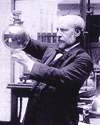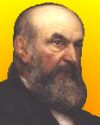
On 5 Jun 1878, liquid air obtained at a temperature of -192ºC was exhibited by Professor James Dewar at the Royal Institution, London. For several little known, but interesting, discoveries related to air, read A Summary of Scientific Discoveries and Inventions Relating to the Air from Haydn's Dictionary of Dates, 1904. There you can learn about such novelties as an air-driven clock, air-engine for railway carriages or the more familiar air brush (Aerograph) used by artists.

On 5 Jun 1819, John Couch Adams was born, the English astronomer and mathematician, one of two people who independently discovered a new planet. Today's book pick is: The Neptune File: A Story of Astronomical Rivalry and the Pioneers of Planet Hunting (Science Matters), by Tom Standage, (also author of The Victorian Internet), who describes the activity leading up to the discovery. A French astronomer calculated the planet's position shortly after Adams—and an international race to spot the planet itself began.
It is available from Amazon, typically about Used from $1.68. (As of earlier time of writing - subject to change.)
 | I long to speak out the intense inspiration that comes to me from the lives of strong women. They have made of their lives a great adventure. |
 | The mortal enemies of man are not his fellows of another continent or race; they are the aspects of the physical world which limit or challenge his control, the disease germs that attack him and his domesticated plants and animals, and the insects that carry many of these germs as well as working notable direct injury. This is not the age of man, however great his superiority in size and intelligence; it is literally the age of insects. |
 | The most important and urgent problems of the technology of today are no longer the satisfactions of the primary needs or of archetypal wishes, but the reparation of the evils and damages by technology of yesterday. |
| Before you look at today's web page, see if you can answer some of these questions about the events that happened on this day. Some of the names are very familiar. Others will likely stump you. Tickle your curiosity with these questions, then check your answers on today's web page. | |
| Births | |
 | John Couch Adams, born 5 Jun 1819, was a British mathematician and astronomer who independently discovered Neptune. On 3 Jul 1841, Adams had entered in his journal: “Formed a design in the beginning of this week of investigating, as soon as possible after taking my degree, the irregularities in the motion of Uranus ... in order to find out whether they may be attributed to the action of an undiscovered planet beyond it.” Indeed, by Sep 1845, he had solved the issue, though he had difficulty publicizing it in a timely manner. But a French astronomer was also on the task and got most attention when he announced his solution to the French Academy of Science on 10 Nov 1845. Who was the French astronomer who shares credit? |
 | Dennis Gabor was born 5 Jun 1900, the Hungarian-born British electrical engineer who won the 1971 Nobel Prize for Physics. The award was for his invention, a system of lensless, three-dimensional photography that has many applications. He first conceived the idea in 1947, using conventional filtered-light sources. Because such sources had limitations of either too little light or too diffuse, his idea was not commercially feasible until the invention of the laser (1960), which amplifies the intensity of light waves. What was his invention? |
| Deaths | |
 | Augustus Edward Hough Love (1863-1940) was a British geophysicist and mathematician who discovered a major type of earthquake wave that was subsequently named for him. Love assumed that the Earth consists of concentric layers that differ in density and postulated the occurrence of a seismic wave confined to the surface layer (crust) of the Earth which propagated between the crust and underlying mantle. His prediction was confirmed by recordings of the behaviour of waves in the surface layer of the Earth. What did he propose could be determined using measurements of Love waves? |
| Events | |
 | On 5 Jun 1981, an epidemic disease was briefly described by Dr. Michael Gottlieb in the newsletter of the U.S. Centers for Disease Control. This was the first notice to be published on the disease. By what name is the disease now known? |
 | On 5 Jun 1783, the first hot-air balloon was flown for ten minutes by two French brothers at their home town of Annonay, France. Can you name these men? |
 | On 5 Jun 1977, the public sale began of the first personal computers. These were the invention of Steve Wozniak and Steve Jobs. They had the 6502 microprocessor, ability to do Hi-res and Lo-res color graphics, sound, joystick input, and had casette tape I/O. They had a total of eight expansion slots for adding peripherals. Clock speed was 1 MHz. What was the name of this computer? |
Fast answers for the previous newsletter for June 4: Sir Christopher Cockerell • the Circum-Pacific belt • 3,028 feet • the century including the year 780 BC • quagga • he was six years old.
 If you enjoy this newsletter, the website, or wish to offer encouragement or ideas, please send feedback by using your mail reader Reply button.
If you enjoy this newsletter, the website, or wish to offer encouragement or ideas, please send feedback by using your mail reader Reply button. Your click on a Facebook, StumbleUpon, or other social button on the site webpages is also a welcome sign of appreciation. Thank you for using them.
© This newsletter is copyright 2020 by todayinsci.com. Please respect the Webmaster's wishes and do not put copies online of the Newsletter — or any Today in Science History webpage. (If you already have done so, please remove them. Thank you.) Offline use in education is encouraged such as a printout on a bulletin board, or projected for classroom viewing. Online, descriptive links to our pages are welcomed, as these will provide a reader with the most recent revisions, additions and/or corrections of a webpage. For any other copyright questions, please contact the Webmaster by using your mail reader Reply button.
--
If you do not want to receive any more newsletters, Unsubscribe
To update your preferences and to unsubscribe visit this link
Executive Real Estate Business Class
-
"It was like a man with wings. It wasn't like anything you'd see on TV or in a monster movie." ...
About the publisher
Search This Blog
Blog Archive
-
▼
2020
(1542)
-
▼
June
(193)
- TRAVEL: Epic America—Our photographers' picks
- On This Day for June 30 - Night of the Long Knives...
- Newsletter for Tuesday 30 June.
- We told you: Mass-Tracking COVI-PASS Immunity Pass...
- June 30: Theory of Evolution, the Night of Long Kn...
- HISTORY: And the symbols come tumbling down
- Explore the Ocean with Nat Geo Kids Magazine
- New This Week on History News Network
- On This Day for June 29 - London's Globe Theatre d...
- Newsletter for Monday 29 June.
- COVID Cartoon Night (not funny) while we weep for ...
- June 29: Shakespeare's Globe Theatre Burns Down an...
- FAMILY: Getting your kid to help others
- Henry VIII's surprising burial place | The world's...
- On This Day for June 28 - Assassination of Archduk...
- Say the wrong thing: lose visitation with your kid...
- Newsletter for Sunday 28 June.
- June 28: Franz Ferdinand Assassinated, the Treaty ...
- The Compass: Kenya
- How the Invention of A/C Changed US Politics
- On This Day for June 27 - Yen made official moneta...
- Newsletter for Saturday 27 June.
- June 27: 1st Women's Magazine, Nuclear Power Stati...
- CORONAVIRUS SPECIAL EDITION: The virus hasn't won ...
- PHOTOGRAPHY: A legendary photographer's enduring r...
- Partner: How to keep your kids learning vocab this...
- Archaeologists Say They've Just Solved The 400-Yea...
- The Roundup Top Ten From History News Network
- On This Day for June 26 - Opening of CN Tower, Bab...
- Newsletter for Friday 26 June.
- Contact Tracer warns of forced vaccinations plus R...
- June 26: Reconnaissance balloons, Kennedy's Clario...
- YOUR WEEKLY ESCAPE: A dangerous quest for hallucin...
- That Was No Bunny: Watch New Episode of Alone Tonight
- ANIMALS: Leave that elephant alone
- On This Day for June 25 - Korean War begun, Antoni...
- Newsletter for Thursday 25 June.
- June 25: 1st Female PhD, Custer's Last Stand, the ...
- SCIENCE: The heat wave in the Arctic
- Demystified: What Does "SPF" Mean?
- On This Day for June 24 - Russia invaded by Napole...
- Breaking News from History News Network
- Newsletter for Wednesday 24 June.
- June 24: Fatal Medieval Dance Manias, the Gadsden ...
- TRAVEL: Fear of flying and hotel rooms fuels RV boom
- Be at the Front Lines of History's Most Epic Battl...
- On This Day for June 23 - Battle of Bannockburn, C...
- Lowest US coronavirus deaths reported since March ...
- Newsletter for Tuesday 23 June.
- June 23: World's Oldest Parliament, the Contracept...
- Life Under The Shah: What Iran Looked Like Before ...
- HISTORY: A swift goodbye to some racist imagery (a...
- A whole year of Britannica Premium for $49.99?
- New This Week on History News Network
- On This Day for June 22 - Mutiny against Henry Hud...
- Newsletter for Monday 22 June.
- Clintons and Gates Connected at the Hip plus Cardi...
- June 22: Galileo Galilei Recants, Last Shot of the...
- FAMILY: How to keep kids safe as places reopen
- On This Day for June 21 - Japanese defenses destro...
- Newsletter for Sunday 21 June.
- June 21: 1st Governor General of India, Fermat's L...
- The Compass: Ecuador
- On This Day for June 20 - Casket Letters found, Ho...
- Newsletter for Saturday 20 June.
- CORONAVIRUS SPECIAL EDITION: Could public bathroom...
- Mandatory Vaccines coming: Bill Gates Accuses Tho...
- June 20: Attila the Hun, the University of Oxford ...
- PHOTOGRAPHY: Fatherhood 2020 — ‘Fear and courage a...
- Why is America haunted by its past?
- The Woman Who Claimed Emmett Till Wolf-Whistled At...
- This Week's Roundup Top Ten from History News Network
- Exclusive HistoryExtra podcasts | Listen now
- On This Day for June 19 - Rosenbergs executed for ...
- Newsletter for Friday 19 June.
- World Economic Forum starts The Great Reset initia...
- YOUR WEEKLY ESCAPE: How the ultimate shark photo w...
- June 19: London's Metropolitan Police and the 1st ...
- Predator Encounters. Watch New Episode of Alone To...
- ANIMALS: Finding the snow leopards
- Count on a Source You Can Trust
- On This Day for June 18 - War of 1812 begun, Sir P...
- Newsletter for Thursday 18 June.
- Lockdowns, tracing, testing, vaccinating, and Libe...
- June 18: US-British War of 1812, the Battle of Wat...
- SCIENCE: They grew fearsome. They began soft, and ...
- Demystified: How Are Sports Chosen for the Olympics?
- Breaking News from History News Network
- On This Day for June 17 - Arrest of O.J. Simpson, ...
- Newsletter for Wednesday 17 June.
- June 17: Mumtaz Mahal, the French Revolution and G...
- TRAVEL: They hurtled the world's highest point
- Explore together with Nat Geo Kids magazine
- On This Day for June 16 - First woman in space, Jo...
- Newsletter for Tuesday 16 June.
- June 16: Salvation Army Forms, Bloomsday and FDR's...
- HISTORY: Why we can’t shake COVID-19
- New This Week on History News Network
- On This Day for June 15 - Magna Carta sealed by Ki...
- Yes, they really are forcing changes to your world...
-
▼
June
(193)
-
Blogroll
-
About
HistoryFact










0 comments:
Post a Comment